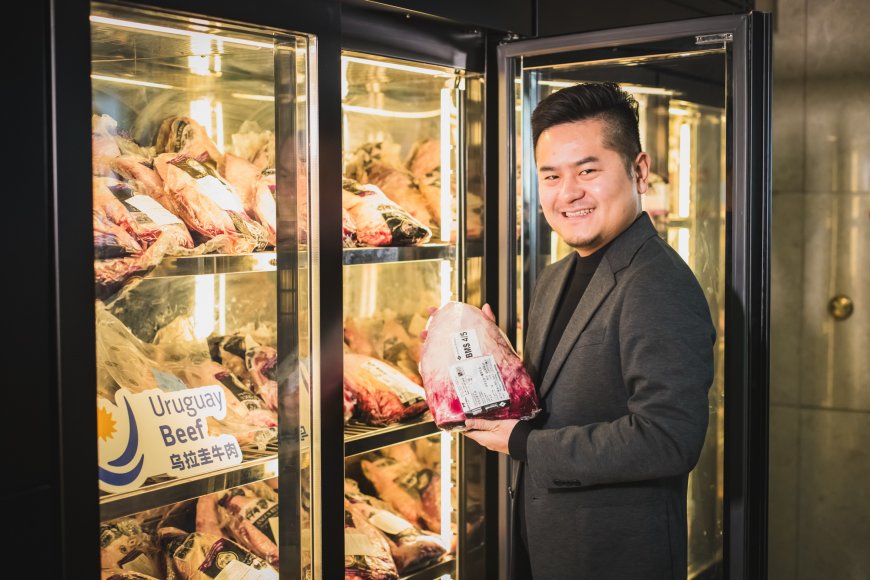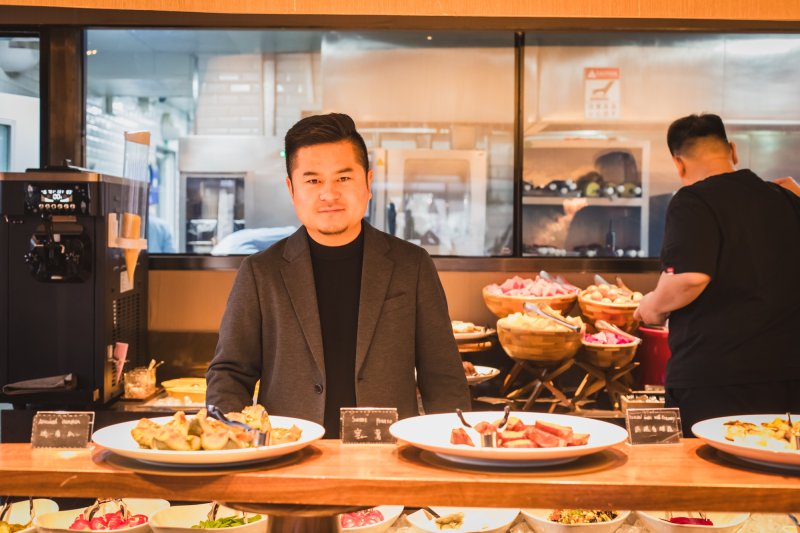Inside Latina: Manager Tom Talks on What Sets Them Apart
Latina Brazilian Steakhouse has been delivering the authentic flavors of Brazil to China for 27 years. Starting with their flagship store at Tongren Lu, Jing'an District, Shanghai, the brand opened its first Beijing restaurant in 2015 and now has three Beijing locations. A paradise for meat lovers, Latina specializes in churrasco—Brazilian-style barbecue—alongside traditional Brazilian snacks, side dishes, and drinks, all crafted using premium ingredients imported from countries like Uruguay, Argentina, the USA and Australia. Their dedication to authenticity and excellent customer service has solidified Latina's reputation as a top destination for Brazilian cuisine and barbecue enthusiasts. To learn more about Latina's journey in Beijing and beyond and what sets them apart from other restaurants here in the capital we talked to Tom who is in charge of operations for Latina's Beijing branches. He has worked at Latina for 15 years, first starting in Shanghai in 2009 and then moving to Beijing in 2015 to manage their first branch in the capital. With over 27 years in China, how do you think Latina has grown and changed over time? During these 27 years, Latina has, of course, faced many challenges including, for example, the 2008 financial crisis and other economic challenges. Despite these, Latina has persevered. Over time, during its development, there have been moments of significant decline, or even times when the business faced potential closure. However, the company always held on. Our founder has always been dedicated to upholding the brand. One of the key aspects is ensuring the highest quality, particularly in our meat and food preparation standards. By maintaining these quality standards, even during tough times, we have been able to persist. Over many years of running a restaurant, consumer habits in China have changed. In recent years especially, customers' expectations for quality have risen significantly. That's why we've seen improvement and growth in the past few years. I think this is mainly because of our dedication to quality, which is the core driver of today's success. What aspects of branding, cuisine, and service set Latina apart from other dining establishments in Beijing? At Latina, our philosophy—guided by our founder— has always been to prioritize the customer. Initially, many of us didn't fully grasp this perspective. For example, even when we encounter demanding customers or challenging situations, we aim to understand the customer's needs rather than view them as problematic. We've always been taught not to immediately assume a customer is causing trouble but to approach the situation as if they are providing valuable feedback to help us improve. This mindset is vital. For instance, all our store managers are trained to handle customer concerns without pre-judging them. Our founder frequently reminds us that when resolving problems, we must first take responsibility rather than push it onto the customer. This approach also instills a strong sense of responsibility among our staff. Even if the restaurant doesn't cause the issue, we still strive to help the customer. Moving on, what is Latina's core business philosophy? Is it more focused on cultural values or on quality ingredients and service? Both aspects are equally important. We've always paid attention to sourcing high-quality ingredients for our customers. While internally, our corporate culture emphasizes a people-first approach. For example, our management structure is an inverted pyramid where leadership serves the frontline employees, not the other way around. When an employee is frequently late, instead of deducting their salary, we investigate the root cause—whether it's due to a long commute, poor scheduling, or dissatisfaction with management. We believe solving these issues from within allows employees to better engage with their work. Even in payroll processing, our founder ensures salaries are paid early if payday coincides with a holiday to avoid causing financial stress for employees. These actions reflect our people-first philosophy. What is the design philosophy behind Latina's Beijing locations? All our stores adopt a tropical rainforest theme inspired by Brazil's Amazon rainforest. We've incorporated Brazilian elements, such as artwork and lush greenery, to create a unique and upscale dining experience. Even our Brazilian customers have said our Beijing restaurants are more luxurious than many in Brazil. How does Latina ensure a consistent and memorable experience for its guests? We ensure every customer enjoys a memorable experience by emphasizing fresh ingredients, attentive service, and our signature churrasco style of serving meats tableside. This level of customization is rare and gives customers a sense of exclusivity. What about your contributions as a manager in Beijing? What have you done personally to enhance Latina's brand image and influence here? Well, at the moment one of

Latina Brazilian Steakhouse has been delivering the authentic flavors of Brazil to China for 27 years. Starting with their flagship store at Tongren Lu, Jing'an District, Shanghai, the brand opened its first Beijing restaurant in 2015 and now has three Beijing locations.
A paradise for meat lovers, Latina specializes in churrasco—Brazilian-style barbecue—alongside traditional Brazilian snacks, side dishes, and drinks, all crafted using premium ingredients imported from countries like Uruguay, Argentina, the USA and Australia. Their dedication to authenticity and excellent customer service has solidified Latina's reputation as a top destination for Brazilian cuisine and barbecue enthusiasts.
To learn more about Latina's journey in Beijing and beyond and what sets them apart from other restaurants here in the capital we talked to Tom who is in charge of operations for Latina's Beijing branches. He has worked at Latina for 15 years, first starting in Shanghai in 2009 and then moving to Beijing in 2015 to manage their first branch in the capital.

With over 27 years in China, how do you think Latina has grown and changed over time?
During these 27 years, Latina has, of course, faced many challenges including, for example, the 2008 financial crisis and other economic challenges. Despite these, Latina has persevered. Over time, during its development, there have been moments of significant decline, or even times when the business faced potential closure.
However, the company always held on. Our founder has always been dedicated to upholding the brand. One of the key aspects is ensuring the highest quality, particularly in our meat and food preparation standards. By maintaining these quality standards, even during tough times, we have been able to persist.
Over many years of running a restaurant, consumer habits in China have changed. In recent years especially, customers' expectations for quality have risen significantly. That's why we've seen improvement and growth in the past few years. I think this is mainly because of our dedication to quality, which is the core driver of today's success.

What aspects of branding, cuisine, and service set Latina apart from other dining establishments in Beijing?
At Latina, our philosophy—guided by our founder— has always been to prioritize the customer. Initially, many of us didn't fully grasp this perspective. For example, even when we encounter demanding customers or challenging situations, we aim to understand the customer's needs rather than view them as problematic.
We've always been taught not to immediately assume a customer is causing trouble but to approach the situation as if they are providing valuable feedback to help us improve. This mindset is vital. For instance, all our store managers are trained to handle customer concerns without pre-judging them.
Our founder frequently reminds us that when resolving problems, we must first take responsibility rather than push it onto the customer. This approach also instills a strong sense of responsibility among our staff. Even if the restaurant doesn't cause the issue, we still strive to help the customer.

Moving on, what is Latina's core business philosophy? Is it more focused on cultural values or on quality ingredients and service?
Both aspects are equally important. We've always paid attention to sourcing high-quality ingredients for our customers. While internally, our corporate culture emphasizes a people-first approach. For example, our management structure is an inverted pyramid where leadership serves the frontline employees, not the other way around.
When an employee is frequently late, instead of deducting their salary, we investigate the root cause—whether it's due to a long commute, poor scheduling, or dissatisfaction with management. We believe solving these issues from within allows employees to better engage with their work.
Even in payroll processing, our founder ensures salaries are paid early if payday coincides with a holiday to avoid causing financial stress for employees. These actions reflect our people-first philosophy.
What is the design philosophy behind Latina's Beijing locations?
All our stores adopt a tropical rainforest theme inspired by Brazil's Amazon rainforest. We've incorporated Brazilian elements, such as artwork and lush greenery, to create a unique and upscale dining experience. Even our Brazilian customers have said our Beijing restaurants are more luxurious than many in Brazil.

How does Latina ensure a consistent and memorable experience for its guests?
We ensure every customer enjoys a memorable experience by emphasizing fresh ingredients, attentive service, and our signature churrasco style of serving meats tableside. This level of customization is rare and gives customers a sense of exclusivity.

What about your contributions as a manager in Beijing? What have you done personally to enhance Latina's brand image and influence here?
Well, at the moment one of the projects I'm working on is collaborating with third-party charitable organizations. We've been discussing partnerships to organize charity events and donations.
In addition to promoting the brand, we're also reflecting on our social responsibility. Our founder has emphasized the importance of this. For instance, we are in talks with welfare institutions and care homes to plan donations and support initiatives.
How does Latina engage with the local Beijing community while staying true to its Brazilian roots?
We've participated in local activities, such as food festivals or collaborations with international student communities. For example, we work with groups from universities like Tsinghua, Peking University, and China University of Political Science and Law, as well as language schools. We provide sponsorships, such as free drinks and snacks, to support their events.
These events help increase our visibility and establish connections. For instance, during international school fairs, like those at Harrow or Dulwich, we've also participated as representatives of Brazilian cuisine.

Lastly, what are your thoughts on Latina's vision for future growth, both in Beijing and across China?
For Beijing, our plan is to expand from three stores to six. We're actively looking for suitable locations to open new stores.
Nationwide, we're considering establishing regional offices. Right now, everything is centralized at the headquarters, so I personally handle all communications regarding procurement, finances, and other operations. In the future, having a dedicated office in Beijing with specialized staff for these functions would enhance efficiency.
To thank Beijinger readers for their continued support, Latina will also be giving out some special prizes to followers who comment on this article! One person will win a voucher for an Original Brazilian BBQ Dinner and five others will win a coupon for a Latina bear plushie (you can exchange it at any Latina store). Finally, if you scan the QR code below you'll receive and RMB 50 voucher for Latina!

READ: 24 for '24: Latina With Authentic Brazilian Barbecue
Images: Uni You
Paid for by Latina



























































